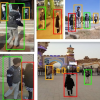Arnab Karmakar

arnabk1 [at] uw [dot] edu
Hey there!
I’m Arnab, a Master’s student specializing in Machine Learning and GPU Computing at the Department of Electrical and Computer Engineering, University of Washington, Seattle.
As a Graduate Researcher at the Reasoning, AI, and VisioN (RAIVN) Lab under the guidance of Prof. Ranjay Krishna, my work revolves around Multimodal Machine Learning. My research focuses on efficient representation learning methods for foundation models, improving image and video understanding.
I recently completed my research internship at Brainchip where I developed an efficent embedding compression technique to make low power edge devices faster. During summer, I interned at Truemedia.org where I was responsible for developing end-to-end ML models for detecting deepfake media.
Prior to my Master’s, I was a Senior Research Scientist at the Human Space Flight Center, Indian Space Research Organization (ISRO). In this role, I led the development of a real-time astronaut health monitoring system using Machine Learning. Notably, I led the Crew Training Simulator team and Risk Assessment team for ISRO’s first manned mission, ‘Gaganyaan.’
I am always interested to discuss about the recent developments and future directions in the evolving field of AI. The best projects often begin with a simple conversation.
news
| Sep 16, 2024 | Joined Brainchip as a Machine Learning Research Intern or Fall 2024! |
|---|---|
| Jun 10, 2024 | Joined Truemedia.org as a Machine Learning Intern or Summer 2024! |
| Jun 4, 2024 | Our GPU Programming project on improving GEMM kernels usig Stream-k won the 2nd best project award from AMD! (ppt) (report) |
| Mar 16, 2024 | Developed a multi-agent personified chatbot mimicking the famous persona of Steve Jobs (link) |
| Mar 7, 2024 | Completed the Project “Analysis and Benchmarking of Prompt Injection Attacks on Back Box Large Language Models (LLMs)” (link) |
